Engaging Games That Boost Vocabulary Skills for Kids
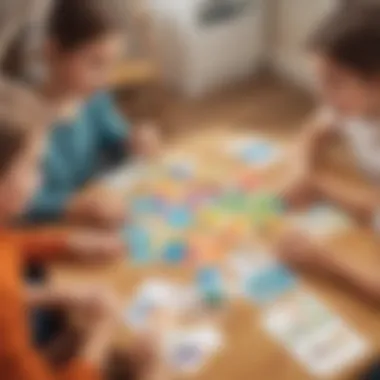
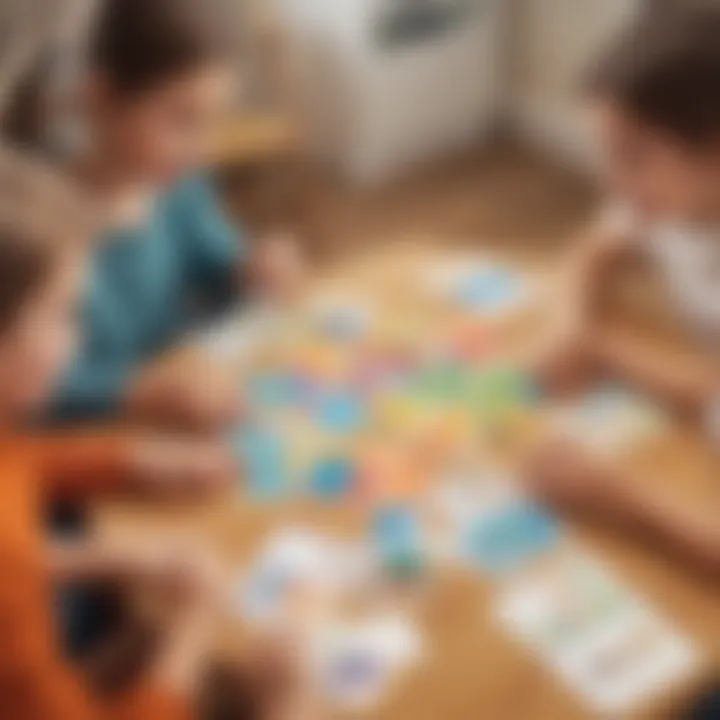
Intro
This article focuses on interactive and engaging games that can significantly enhance vocabulary skills in elementary school children. The goal is to explore various activities that blend fun and education, ensuring a comprehensive learning approach. These strategies are tailored to meet the specific needs of children aged five to twelve, making the process of vocabulary acquisition enjoyable.
Creative Activities
Craft Ideas
Crafting serves as a valuable medium through which children can connect with language in tangible ways. Simple crafts like word collages or vocabulary flashcards stimulate creativity while building a strong vocabulary foundation. Engaging children in these activities not only promotes learning but also encourages self-expression.
Step-by-Step Guides
To implement craft ideas effectively, clear and concise instructions are beneficial. Here’s a basic guide for creating a word collage:
- Gather materials: colored paper, scissors, glue, and magazines.
- Choose a theme, such as animals or emotions.
- Cut out words and pictures from the magazines related to the theme.
- Arrange the cutouts on the colored paper, and glue them down to create a collage.
- Display the collage in a prominent place to reinforce vocabulary.
Educational Value
Engaging in craft activities offers numerous educational benefits. First, it enhances fine motor skills as children manipulate materials. Additionally, it fosters critical thinking when children decide how to arrange their work. Lastly, discussing the completed crafts reinforces vocabulary understanding through contextual usage of words.
Fun Quizzes
Quiz Topics
Quizzes can ignite the curiosity of young learners. Notable topics covered in platforms like ElemFun include animals, food, geography, and even science. This diverse range encourages kids to explore various subjects while developing their vocabulary.
Question Types
The quizzes feature a variety of question types to maintain engagement. Multiple-choice questions challenge children’s recall abilities. Fill-in-the-blank questions make it essential for learners to remember specific vocabularies. True or false questions also stimulate critical thinking and comprehension.
Knowledge Reinforcement
Quizzes play a crucial role in reinforcing knowledge. As children complete them, they experience immediate feedback. This process consolidates their learning and highlights areas needing improvement. Engaging with quizzes regularly can lead to better vocabulary retention.
Fact-Based Articles
Topics
Fact-based articles present an excellent opportunity for vocabulary enhancement. Topics range from nature and history to health and technology, allowing children to engage with substantial content. This vast selection caters to different interests, thus fostering a love for reading and learning.
Engaging Content
Articles need to be presented in a clear manner. Using simple language ensures that children can follow along easily. Visual elements such as images or infographics can also make information more appealing and accessible.
Understanding the Importance of Vocabulary
Building a strong vocabulary is foundational for young learners. It enables children to express themselves more clearly and understand more of what they read. In this article, we will discuss the significant role vocabulary plays in not only academic success but also in everyday interactions. When children develop their vocabulary skills, they gain access to a wider range of information, enhancing their comprehension across subjects.
Why Vocabulary Matters
Vocabulary is the cornerstone of effective communication. A strong vocabulary allows children to articulate thoughts and ideas more precisely. This clarity is beneficial in both speaking and writing. The more words children know, the better they can convey their feelings and understand others.
Learning vocabulary also plays a vital role in literacy development. Children with robust vocabularies tend to perform better in reading assessments. They can decode text more effectively and make connections between words and their meanings. Understanding vocabulary helps children engage more with texts, leading to a positive feedback loop of reading and learning.
Moreover, vocabulary skills are a strong predictor of future academic achievement. Engaging with words through games can foster a lifelong love for learning. Encouraging vocabulary growth from an early age increases the likelihood that children will become confident and competent readers as they progress through school.
Impact on Communication Skills
Effective communication skills are crucial in all walks of life, whether it be in school, at home, or within the community. Children with strong vocabulary skills can express their ideas clearly and listen to others with better comprehension. This engagement is vital for building relationships and understanding social cues.
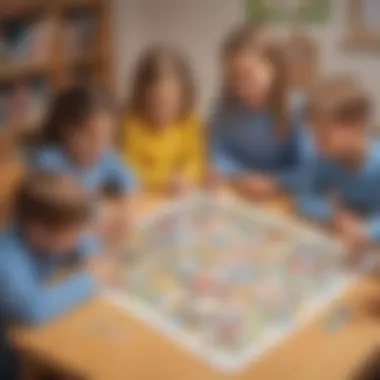
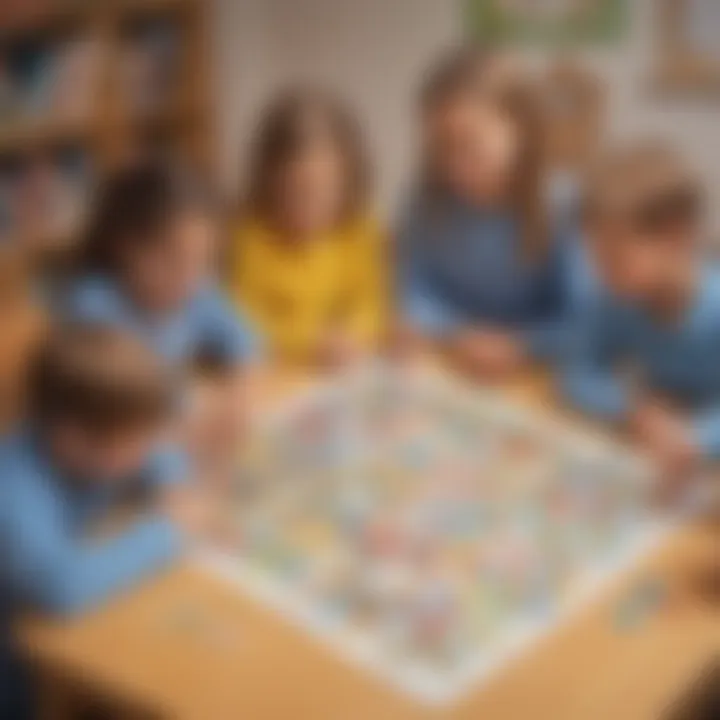
Vocabulary also fosters critical thinking skills. When children encounter new words, they often must consider context and connotation. This analytical approach can lead to greater problem-solving abilities. Engaging with new words also encourages curiosity, as children learn to ask questions about meanings and usage.
In the context of education, a strong vocabulary translates to enhanced participation in classroom discussions and collaborative projects. Children who can express themselves with confidence are more likely to engage in group work, ask questions, and share insights with their peers. Overall, the positive impact of vocabulary extends beyond academic settings, serving as an essential tool for effective communication in various aspects of life.
Identifying Age-Appropriate Games
Identifying games that are age-appropriate is crucial for effective vocabulary enhancement. The developmental stage of children greatly influences their learning methods. Different age groups have distinct cognitive abilities and interests. Therefore, tailoring games to specific age levels ensures that the activities are both engaging and educational.
Selecting suitable games can enhance motivation and participation. Younger children often require more visual and tactile stimuli. This can help keep their attention and make learning enjoyable. In contrast, older children might prefer challenges that stimulate critical thinking and creativity. By properly identifying age-group specific games, caregivers can foster a more effective vocabulary learning environment.
Additionally, age-appropriate games facilitate social interaction. Games designed for younger children often promote cooperative play and teamwork. This not only helps with vocabulary but also develops social skills. For older children, competitive games can inspire a healthy desire to improve language abilities, fostering a spirit of friendly rivalry.
Games for Younger Children
For younger children, engaging and interactive games are vital. Games like Bingo, where children recognize words and match them to images, are excellent for vocabulary growth. The visual element enhances memory retention. Children enjoy the excitement of shouting “Bingo!” when they fill their card, resulting in a positive association with learning.
Picture Word Match is another effective game. In this game, children pair images with corresponding vocabulary words. This activity can be played with a simple deck of cards or even through a digital app. As children make connections, they develop language skills while having fun.
Storytime games can also be beneficial. Using picture books, caregivers can pause and ask questions. Words can be highlighted, and children are encouraged to describe what they see. This interaction not only builds vocabulary but also enhances comprehension skills. Such games allow children to engage deeply with language in a relaxed setting.
Games for Older Children
Older children require games that challenge their intellect and spark creativity. Scrabble is a classic word-based game that encourages strategizing and vocabulary expansion. Each tile provides an opportunity for players to explore meanings and spellings of various words, making it a valuable resource for learning.
Crossword puzzles are also effective for this age group. They require critical thinking to complete. Clues encourage word recall and help reinforce definitions. These puzzles can be created around specific themes, increasing relevance to the child's interests or studies.
Digital vocabulary apps, such as Dictionary.com or Vocabulary.com, can also play a key role. These platforms often include interactive quizzes and flashcards, making learning more dynamic. They allow older children to independently track their progress, which enhances their motivation to improve.
Incorporating a variety of games tailored for different age groups ensures a holistic approach to vocabulary development. By selecting the right games, caregivers can support children's language acquisition effectively.
Types of Vocabulary Games
Vocabulary games play a vital role in the development of language skills for children. They not only make learning fun but also help in retaining new words effectively. Engaging in different types of vocabulary games can cater to various learning styles, making it easier for children to understand and use new vocabulary in context. Through these games, children can explore language intricacies and build confidence in their communication abilities. Working in a game setting also reduces the pressure of formal learning, allowing for a more relaxed approach to vocabulary acquisition.
Word Association Games
Word association games are simple yet powerful tools for enhancing vocabulary. The concept is straightforward; participants say a word related to the previous word mentioned. For example, if one child says “dog,” the next could say “bark,” followed by “tree” if another child wants to relate the idea to a dog’s presence in outdoor settings. This type of game encourages quick thinking and helps in recognizing connections between words.
- Benefits: These games enhance mental agility and deepen understanding of vocabulary relationships.
- Considerations: Make sure to guide the children when they struggle to find appropriate associations.
Crossword Puzzles
Crossword puzzles blend entertainment with education. They require children to think critically as they find words that fit specific clues. This process encourages them to recall vocabulary they may not use often. Furthermore, crosswords can be tailored to align with curriculum topics, making them relevant to students.
Crossword puzzles enhance problem-solving skills while enriching vocabulary.
- Benefits: They foster critical thinking and can be a group activity that promotes teamwork.
- Considerations: Choose age-appropriate puzzles to keep frustration levels low.
Scrabble and Word Games
Scrabble is a classic word game that combines strategy with vocabulary enhancement. Players score points by creating words on a board using letter tiles. It encourages players to think about word formation and spelling, while also challenging them to learn new words. Games like Boggle or Word Search also follow similar principles and can be equally effective.
- Benefits: Players expand their vocabulary and improve spelling.
- Considerations: Make sure to explain the scoring system and rules clearly for an effective game.
Flashcard Games
Flashcards are versatile tools for vocabulary enhancement. They can feature words, images, or both. When used in games, children can match words to images or create memory games. This method caters to visual learners and can make recalling information easier.
- Benefits: Flashcards allow for quick reviews and can be used in various game formats.
- Considerations: Use a mix of familiar and unfamiliar words to maintain interest while challenging the children.
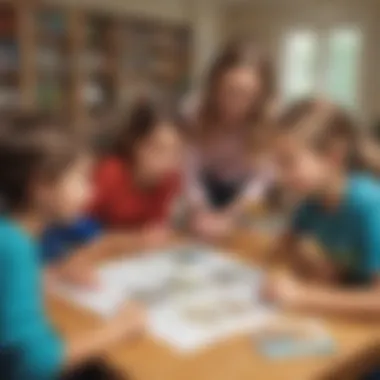
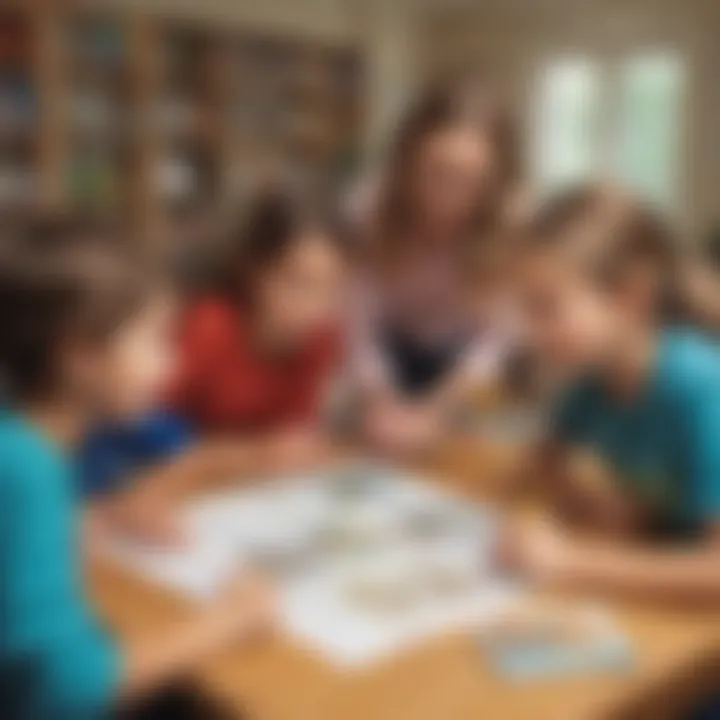
Digital Vocabulary Apps
In our technology-driven age, digital vocabulary apps offer interactive and engaging ways to learn. Applications like Quizlet or Vocabulary.com can provide tailored challenges that adapt to the child’s progress. These platforms often include gamified features, making learning vocabulary captivating.
- Benefits: Instant feedback and personalized learning tracks appeal to different learning speeds.
- Considerations: Monitor screen time to ensure it doesn’t become excessive.
In summary, these various types of vocabulary games cover a broad spectrum, addressing diverse learning preferences for children. They encourage a natural and engaging vocabulary acquisition process that can significantly benefit their linguistic development.
Creating a Vocabulary Game Environment
Creating an optimal environment for vocabulary games is essential for fostering engagement and learning. This section delves into the specific elements that can help enhance vocabulary acquisition in a positive atmosphere. A well-organized space contributes to the effectiveness of the games, motivating children to participate actively and enjoy the learning experience. Factors such as arrangement, comfort, and appropriate materials play a significant role.
Setting Up the Space
When it comes to setting up the space for vocabulary games, several considerations can make a difference. First, choose a location that is free from distractions. A quiet area allows children to concentrate fully on the game. Here are a few things to keep in mind when arranging the space:
- Lighting: Ensure the area is well-lit. Natural light is ideal, but soft artificial lighting can work too.
- Seating Arrangements: Use comfortable seating options that enable children to move easily, such as cushions or bean bags. This can make the learning feel more approachable.
- Flexible Layout: Arrange the space so children can easily collaborate and interact. Their ability to discuss words and strategies enhances comprehension.
The way the space is set affects focus and atmosphere. By thoughtfully designing it, you promote a sense of excitement about learning.
Gathering Materials
The next critical element in creating a vocabulary game environment involves gathering the appropriate materials. The right tools can enhance gameplay and support learning objectives. Here are some materials to consider:
- Flashcards: These are great for quick recall and can be customized to suit different vocabulary levels. Making them colorful or adding images can make them more engaging for children.
- Game Boards: If using games like Scrabble or custom board games, ensure they are accessible and well-organized. A clean and organized board helps minimize confusion during gameplay.
- Digital Tools: Tablets or computers with vocabulary apps can be useful. Ensure that the appropriate apps are downloaded beforehand, so there are no interruptions when playing.
- Writing Supplies: Gather materials like pencils, markers, and notebooks. These tools can help kids jot down new words or ideas, reinforcing the vocabulary learned during the games.
When parents and caregivers thoughtfully prepare the space and materials, they cultivate a richer learning experience. The efforts to create an interactive and comfortable game environment will facilitate better language acquisition. Encouraging children to participate in these games regularly will lead to significant vocabulary development over time.
"A well-set environment is a canvas for creativity and learning."
Overall, creating a vocabulary game environment is not merely about the games themselves; it is about establishing a space that promotes focus, interaction, and fun in the learning process.
Incorporating Vocabulary Games into Daily Routines
Incorporating vocabulary games into daily routines is essential in fostering language skills among young learners. These games serve as practical tools that break the monotony of typical learning methods. They create an enjoyable atmosphere where children are more receptive to learning. By blending education with play, vocabulary acquisition becomes less daunting and more engaging.
When parents and caregivers make a deliberate effort to include vocabulary games in daily activities, they promote consistent practice, which is vital for retention. Regular exposure to new words allows children to experiment with language, solidifying their understanding and expanding their vocabulary. The key is to balance learning with fun, ensuring children see language learning as an exciting journey rather than a chore.
Integrating Games into Homework
Integrating games into homework can transform a mundane task into a dynamic learning experience. When parents design homework activities that include vocabulary games, children are likely to invest more effort and interest into their assignments. For instance, turning spelling practice into a game where kids earn points for correct answers fosters a sense of competition and motivation.
Another effective method is to use board games like Scrabble or Boggle as homework tools. These games can be tailored to align with vocabulary lists from school. Providing a structured environment where learning can take place through play encourages cognitive engagement. Hence, children not only complete assignments but also enjoy the process.
Some additional strategies to consider include:
- Creating vocabulary challenges: Encourage children to find synonyms or antonyms for words in their homework.
- Using digital apps: Many educational apps, like Wordscapes or Duolingo, incorporate vocabulary games that align with academic goals.
- Pairing games with discussions: After completing homework, ask children to discuss what they learned using the new words.
Using Games During Family Time
Family time is an opportunity to further enrich children's vocabulary through games. When families engage together in vocabulary activities, it not only strengthens bonds but also promotes language development. Children learn from observing and interacting with their family members, making game time an invaluable experience.
Activities can range from simple word games like Hangman to storytelling sessions where family members create tales using specific vocabulary words. Such practices can deepen understanding and usage of words within context.
Furthermore, incorporating books into family game nights can enhance this experience. Reading aloud and discussing new vocabulary within books can stimulate meaningful conversations. Here are a few ideas for family vocabulary games:
- Pictionary: Draw words or phrases that require the family to guess.
- Charades: Use actions and descriptions to express vocabulary words.
- Word association: Take turns saying a word related to the previous word in the circle.
The playful environment that emerges during family game time allows children to reinforce their vocabulary in a relaxed atmosphere. Creating this cohesive learning space additionally nurtures a lifelong love for language.


Assessing Vocabulary Growth
Assessing vocabulary growth is an essential component of enhancing vocabulary skills among children. This section outlines why tracking progress and recognizing areas for improvement can elevate the learning experience. Assessment serves as a guide for both caregivers and educators to understand individual development and identify effective strategies that work best for each child. Furthermore, knowing how a child progresses helps to keep them motivated.
Tracking Progress
Monitoring a child’s vocabulary acquisition can take various forms. Regular assessments help to determine improvements. One effective method is through informal evaluations, such as observing the usage of new words in conversations. Here are some specific approaches:
- Word Journals: Encourage children to maintain a vocabulary journal. They can write down new words they encounter, along with their definitions and sample sentences. This serves both as practice and self-assessment.
- Quizzes and Games: Use quizzes or vocabulary games that incorporate words they have recently learned. This not only makes tracking progress enjoyable but also allows you to see which areas they excel in.
- Parent and Teacher Observations: Regularly have discussions with other caregivers or educators to compare notes regarding vocabulary usage in different contexts. This collaborative approach brings more perspectives.
Regular tracking not only fosters growth but also boosts confidence in a child’s language abilities.
Identifying Areas for Improvement
Recognizing where a child struggles with vocabulary is crucial for targeted learning. This assessment does not have to be overly formal. Here are some strategies:
- Analyze Journal Entries: Review the vocabulary journals for patterns. Look for frequently misspelled words or words that are not used in sentences. This indicates areas needing focus.
- Error Analysis: Instead of only looking at correct responses, examining why certain words were misunderstood can be very revealing. Understanding errors enables effective correction methods.
- Feedback and Encouragement: Make feedback constructive. Highlight strengths before addressing weaknesses to keep the child encouraged while focusing on areas for growth.
By assessing vocabulary growth through these methods, caregivers and educators create a supportive atmosphere for continuous improvement. Individualized attention allows for enhanced vocabulary development, making learning more effective and engaging.
Encouraging a Love for Language
Encouraging a love for language is vital for children's overall educational experience. When young learners develop an affinity for language, they are more likely to engage with words both in reading and in conversation. This engagement lays the foundation for future success in academic and social settings. Vocabulary adventures become enjoyable, instilling a sense of curiosity rather than just stress. When children learn through games, they often discover the joy that language can bring.
Promoting Reading Habits
Promoting reading habits is essential in developing vocabulary skills. When children read regularly, they encounter diverse words. This exposure is critical for language development. Reading opens up new worlds. Children learn about different cultures, ideas, and characters. Enhancing vocabulary through reading can be simple. Here are some strategies to support this:
- Create a routine: Designate a specific time each day for reading. Consistency helps develop a habit.
- Choose interesting books: Selecting stories that grab attention can stimulate interest.
- Make it interactive: Ask questions about the story. This invites critical thinking and discussion.
Consistent reading habits result in a noticeable increase in vocabulary. As children gain more words, they can express their thoughts more clearly. This also leads to improved comprehension skills.
Engaging in Conversations
Engaging in conversations is another crucial element in fostering a love for language. Conversations allow children to practice new vocabulary in real-time situations. This practical application is effective. They learn to use words contextually. Here are some ways to enhance conversational engagement:
- Active listening: Encourage children to pay attention to others. This skill helps them learn how words are used.
- Discuss daily events: Talk about experiences, activities, or lessons from the day. Simple discussions can spark a child's interest in vocabulary usage.
- Encourage questions: When children ask about unfamiliar words, it demonstrates curiosity. It is essential to respond positively and provide explanations.
By regularly engaging in conversations, children feel more confident in using language. Their vocabulary grows beyond rote memorization. This creates a richer language experience, allowing children to express themselves with ease and clarity.
Overall, cultivating a love for language in children is essential, setting a solid foundation for effective communication and comprehensive understanding.
The Role of Educators in Vocabulary Development
Vocabulary development is a fundamental aspect of a child’s overall education. While children learn new words in various ways, educators play a crucial role in facilitating this growth. They not only teach vocabulary but also foster an environment that encourages exploration and integration of language into everyday life.
An effective vocabulary program leads to better reading comprehension and improved writing skills. Educators can utilize engaging games as a tool to motivate students. This interactive approach makes learning enjoyable, which can lead to increased retention of new words.
The role of educators in vocabulary development is indispensable. They provide the framework within which children can explore language and its uses effectively.
Facilitating Vocabulary Games in Class
Incorporating vocabulary games in the classroom can transform a mundane lesson into a dynamic learning experience. Educators should select games that align with the vocabulary curriculum. Choosing appropriate games can enhance the engagement level, making students more eager to participate.
Games such as Scrabble, Pictionary, or Bingo can be integrated into the lesson plan. These activities allow students to use words in context, fostering a deeper understanding of language. It is essential for educators to provide clear instructions and to facilitate discussions afterward. This reflection helps students articulate their experiences and solidify their understanding of the new vocabulary.
Furthermore, educators can group students strategically for collaborative games. This peer interaction not only enhances language skills but can also build social connections among students, promoting a supportive classroom culture.
Creating a Supportive Learning Environment
A supportive learning environment is essential for strong vocabulary development. Educators must create a space where students feel comfortable experimenting with new words. This includes implementing routines that encourage language usage without the fear of making mistakes.
One effective strategy is to display vocabulary words throughout the classroom. Visual reminders can stimulate interest and prompt discussions. Educators should also encourage sharing experiences related to words learned during games. This practice enhances the connection between vocabulary and personal experiences, which can improve retention.
Educators should be mindful of individual students' needs. Differentiation in vocabulary instruction can cater to varying literacy levels. This might involve pairing advanced students with those who need more support, allowing for peer teaching opportunities. Through these efforts, educators contribute significantly to the development of vocabulary skills among students.







